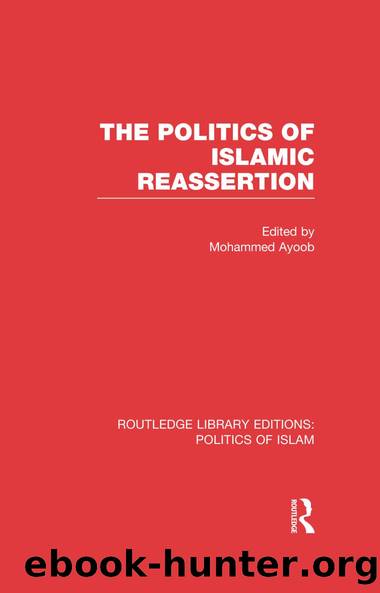The Politics of Islamic Reassertion (RLE Politics of Islam) by Mohammed Ayoob

Author:Mohammed Ayoob [Ayoob, Mohammed]
Language: eng
Format: epub
ISBN: 9781138912731
Barnesnoble:
Publisher: Taylor & Francis
Published: 2015-05-22T00:00:00+00:00
III
Major political pressure for the creation of an Islamic system in Pakistan has come primarily from the so-called âIslam-pasandâ (literally: âlovers of Islamâ) parties. The most notable of these are the Jamaat-i-Islami, (JI), the Jamiat-ul-Ulema-i-Islam (JUI), and the Jamiat-ul-Ulema-i-Pakistan (JUP). The most prominent and most highly disciplined of these is the Jamaat-i-Islami, founded in 1941 in pre-partition India by Syed Abuâl Aâla Maududi (1903â79).21 Maududiâs writings on Islam have received wide acclaim throughout the Islamic world, and the party which he founded and led for more than three decades has been the most persistent force behind the demand for an Islamic system in Pakistan. Much of the current prevailing ideology expressed in the statements of General Zia reflects Maududiâs long-advocated ideas that (1) the sovereignty of Allah, as defined in the Sharia, should be recognised as the basic law of the land; (2) the state should be ruled by a single man âwhose tenure of office and power are limited only by his faithfulness to the ideology of the stateâ; (3) the Amir (ruler) is to be assisted by a Shura (advisory council) âcomposed of men with the educational qualifications to make valid applications of the fundamental law of the Qurâan and the Sunnahâ; (4) there should be no political parties and no provision for an opposition; (5) non-Muslims may be allowed to reside safely in an Islamic state, but not to hold any policy-making positions; and (6) minorities must vote as separate electorates.22
These ideas have been advocated consistently by the JI since Pakistanâs creation, but they did not achieve any real measure of acceptance until the disruptive developments of 1977. Because of its highly organised and dedicated body of cadres, the JI played a major role in the PNA campaign for the March elections and in the anti-Bhutto agitation which followed. General Ziaâs attraction to Maududiâs ideas and his acknowledged respect for the strength of the Islamic base of the 1977 movement have been reinforced by his own social backgroud. As a Punjabi muhajir (refugee) from India, of the Arain agricultural caste, he shares many of the social characteristics of the Jamaat membership. He is reported to be a relative of the present Amir of the Jamaat, Mian Tufail Muhammad.
The other two Islam-pasand parties represent a long-standing division among Muslim leaders (Ulama, literally âlearned ones,â schooled in Islamic learning) dating back to pre-partition India. The JUI includes those ulama identified with the Deobandi school of âNationalistâ Muslims who tended to side with the Indian National Congress in opposing the creation of Pakistan, while the JUP represents the Barelvi School which supported partition. The formation of the Pakistan National Alliance to fight the 1977 elections was regarded as a major political achievement because it overcame the mutual animosity which had previously existed among these three parties. Bhutto even taunted them with the charge that ulama who couldnât even join in prayers together could hardly expect to form a united and stable government. In this context, the vagueness and ambiguity as
Download
This site does not store any files on its server. We only index and link to content provided by other sites. Please contact the content providers to delete copyright contents if any and email us, we'll remove relevant links or contents immediately.
| Anthropology | Archaeology |
| Philosophy | Politics & Government |
| Social Sciences | Sociology |
| Women's Studies |
Born to Run: by Christopher McDougall(7127)
The Leavers by Lisa Ko(6948)
iGen by Jean M. Twenge(5416)
Sapiens by Yuval Noah Harari(5371)
Spare by Prince Harry The Duke of Sussex(5197)
The Kite Runner by Khaled Hosseini(5179)
Machine Learning at Scale with H2O by Gregory Keys | David Whiting(4313)
Bullshit Jobs by David Graeber(4190)
Never by Ken Follett(3957)
Goodbye Paradise(3810)
Livewired by David Eagleman(3775)
Fairy Tale by Stephen King(3399)
A Dictionary of Sociology by Unknown(3085)
Harry Potter 4 - Harry Potter and The Goblet of Fire by J.K.Rowling(3074)
The Social Psychology of Inequality by Unknown(3031)
The Club by A.L. Brooks(2925)
Will by Will Smith(2920)
0041152001443424520 .pdf by Unknown(2846)
People of the Earth: An Introduction to World Prehistory by Dr. Brian Fagan & Nadia Durrani(2738)
